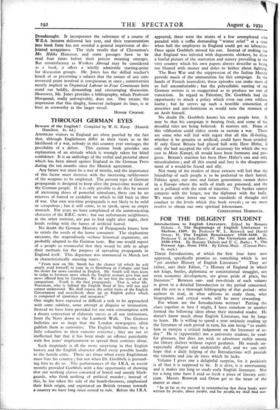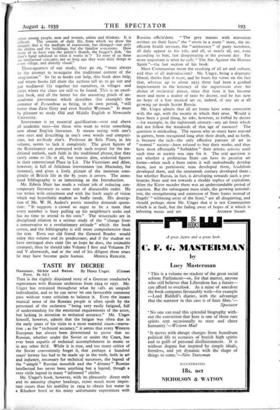FOR THE DILIGENT STUDENT
Introductions to English Literature. Edited by Bonamy Dobree.—I. The Beginnings of English Literature to Skelton, 1509. By Professor W. L. Renwick and Harold Orton; II. The English Renaissance 1510-1688. By Professor V. de Sola Pinto; IV. The Victorians and After, 1830-1914. By Bonamy Dobree and E. C. Batho ; V. The Present Age, from 1914. By Edwin Muir. (Cresset Press. 6s. each.) THESE Introductions, of which the first four have now
appeared, specifically promise us something which is not " yet another History of English Literature." They are rather, says their Editor, " a History of England in which not kings, battles, diplomatic or constitutional struggles, nor even economic development, are given pride of place, but literature." Between one- and two-thirds of each volume is given to a detailed Introduction to the period concerned, and the rest to a thorough bibliography of that period : what authors to read, in what editions to study them, what biographies and critical works will be most rewarding.
For whom are the Introductions written? Putting the clues together as best I might, I have somehow or another formed the following ideas about their intended reader. He doesn't know much about English Literature, but he longs to learn. He is willing to spend a year seriously reading up the literature of each period in turn, his aim being " to enable him to exercise a critical judgement on the literature of to- day." He is (apparently) not a university student; he reads for pleasure, but does not wish to adventure rashly among the library shelves without expert guidance. He sounds un- expectedly diligent and undeniably dull, and we can only hope that a daily helping of the Introductions will provide the vitamins and joie de vivre which he lacks.
Volume I gives one a delightful surprise, for it positively is all that it is supposed to be. It is alive, it is entertaining, and it makes one long to study early English literature. Not for a long time have I read so fresh a piece of literary criti- cism. Messrs. Renwick and Orton get to the heart of the matter at once :
" In so far as we succeed in remembering that these books were written by people, about people, and for people, we shall find our-
selves among people, men and women, artists and thinkers. It is difficult. The content of daily life, from which we draw the imagery that is the medium of expression, has changed—not only the clothes and the buildings, but the familiar avocations. How many of us have seen the potter's thumb, the beggar's dish, ' the dyer's hand subdued to what it works in '? To most of us these are intellectual concepts; not so long ago they were daily things in every village, and directly visuaL" Three-quarters of our study, they go on, " must always be the attempt to re-acquire the traditional content of the imagination." So far as books can help, this book does help, and where books fall short the authors tell us to go out and put mediaeval life together for ourselves, in villages and
cities where the clues are still to be found. This is an excel- lent book, and all the better for the seasoning pinch of un- academic irreverence which describes (for example) the romance of Ferumbras as being, in its own period, " still
better than Zane Grey and even Stanley Weyman." It must be pleasant to study Old and Middle English at Newcastle University.
Irreverence is an essential qualification—over and above all academic ones—for those who want to write something new about English literature. It means seeing with one's own eyes and describing in one's own words and compari- sons, not anybody else's. Professor de Sola Pinto, in his volume, seems to lack it completely. The great figures of the Renaissance are portrayed with such respect for the tra- ditional outlook, such faith in the traditional phrase, that they rarely come to life at all, but remain dim, undusted figures
in their conventional Place in Lit. The Victorians and After, however, is full of felicitous irreverences (on Macaulay, for instance), and gives a lively picture of the immense com- plexity of British life in the 85 years it covers. The anno-
tated bibliography is as interesting as the Introduction. Mr. Edwin Muir has made a valiant job of reducing con- temporary literature to some sort of discussable order. He too writes with enjoyment and with the fresh angle of vision which our hypothetic student so badly needs. His descrip- tion of Mr. W. H. Auden's poetic morality demands quota- tion : " It suggests a crowd so eager to be a team that every member is busy pulling up his neighbour's socks and has no time to attend to his own." The wisecracks are in disciplined relation to a serious study of the " change from a conservative to a revolutionary attitude " which the book covers, and the bibliography is still more comprehensive than
the text. Even our old friend the General Reader would enjoy this volume and its predecessor; and if the student we have envisaged does exist (let us hope he does, the estimable creature), then he should take Volume I first and Volumes IV and V afterwards, and at the end of his diligent three years he may have become quite human. MONICA REDLICH.









































 Previous page
Previous page